Rachel Held Evans's Blog, page 2
March 20, 2018
Patriarchy doesn't "protect" women: A response to John Piper
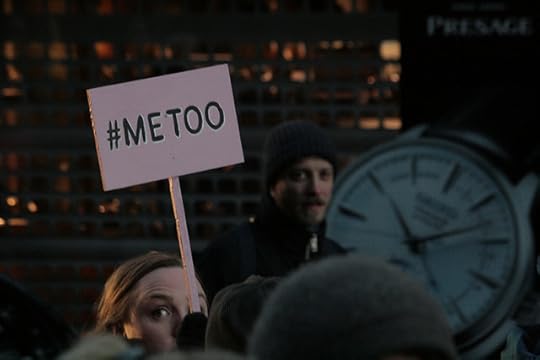
© 2018 GGAADD, Flickr | CC-BY-SA | via Wylio
Today I was asked by a reporter for a brief quote in response to John Piper’s recent article and interview entitled, “Sex Abuse Allegations and the Egalitarian Myth.” My quote turned out a little….long. So I decided to post my thoughts here.
***
In his teaching and preaching, Pastor John Piper promotes a complementarian view of gender, which essentially holds that patriarchy is God’s will for male and female relationships. Men are to be the leaders in their homes, the church, and (to varying degrees) society, while women are to hold subordinate roles in those spheres. In this interview, Piper’s response to the sexual harassment and abuse highlighted by the #MeToo movement is to call for a return to patriarchy, wherein men rule over and “protect” women who in turn “submit” to men. This is a dangerously misguided response for a few reasons.
First, it assumes sexual assault, harassment, and abuse are recent phenomena, products of egalitarian views on gender that grant women equality in the home, church, and culture. But abuses like these have been around for centuries. In fact, Piper can read about some of them in his Bible in the stories of women like Hagar, Tamar, Lot’s daughters, and Bathsheba, all of whom lived in highly patriarchal cultures. The #MeToo movement does not reflect some sudden increase in the abuse of women; rather, it reflects a growing awareness of those abuses, and a mounting, collective fervor to confront them. It’s a movement led by and for women, women who aren’t asking for some sort of paternalistic “protection” because they are fragile females, but rather to be treated with the dignity and respect they deserve simply because they are human beings. As Cameron Baumgartner noted on Twitter, Piper mischaracterizes egalitarianism by "repeating multiple times that it teaches men they don't owe women care and protection. He's twisting egalitarianism's rejection of paternalistic oppression to mean an abdication of care towards our fellow humans."
And yet, with a few exceptions, these efforts to challenge abuse are not coming from the evangelical church for which Piper is a leader, but rather from the broader culture, which Piper routinely maligns for its increasing gender equity. The hypocrisy here is staggering, for as everyone knows, white evangelicals overwhelmingly support President Trump, a man who has been accused by more than twenty women of sexual assault, who is on record bragging about those assaults, and who was recently found in a Christianity Today poll to be evangelicals’ “most trusted celebrity.” If Piper really wants to protect women, he might start by confronting some of America’s most vocal abuse apologists these days: evangelical Christians.
But what’s most dangerous about this posture is that Piper seems to assume that because evangelicals aren’t confronting sexual assault and abuse the way that Hollywood is, then those things must not be happening in their churches, that abuse only occurs in egalitarian communities where women have more power and influence. I would posit that, based on the many stories I hear from women who have left evangelical churches, it’s far more likely that abuse is flourishing in patriarchal homes and churches where women are given little voice and little recourse; it's just getting swept under the rug rather than named and confronted. After all, Piper has said in the past that a woman in an abusive relationship should “endure verbal abuse for a season” and “perhaps being smacked one night,” before seeking help—not from authorities, but from her (male-led) church. As we have seen in the unfolding story of Sovereign Grace Ministries, in highly patriarchal churches where women have no power and where abuse claims are typically handled “in house” by the men in leadership, abuse runs rampant.
That’s because contrary to Piper’s argument, patriarchy isn’t about protecting women; it’s about protecting men. It's about preserving male rule over the home, church, and society, often at the expense of women.
In addition to mishandling his analysis of the #MeToo movement by blaming sexual assault on egalitarianism, Piper grossly mishandles Scripture in an attempt to proof-text his claims. For example, he points to the story of Adam and Eve from Genesis to suggest that an order of authority was established at creation wherein men are designed to lead and protect women, and women are designed to defer to and follow men. The Fall, as Christians sometimes like to call it, was the result of Adam’s failure to live into the masculine role of leading and protecting his wife. This is an…innovative….reading of the text for a lot of reasons, not the least of which is the fact that the Hebrew word used in Genesis 2 to describe Eve, (typically translated “helper”), is formed from the Hebrew word ezer. Far from connoting helplessness or subordination, the word ezer is employed elsewhere in Scripture to describe God, the consummate intervener—the helper of the fatherless (Psalm 10:14), King David’s strong defender and deliverer (Psalm 70:5), Israel’s shield and helper (Deuteronomy 33:29). Ironically, in Genesis, the woman is literally the “strong protector” of the man!
Another staggering mishandling of Scripture occurs when Piper claims that the household codes of the New Testament, wherein the biblical writers urge wives to submit to their husbands and husbands to love their wives, are unique to the Bible and that “there’s nothing like it in any culture in the world.” This is categorically untrue. In fact, the authors of those New Testament texts were undoubtedly drawing from very similar instructions written by Aristotle, Philo and Josephus, known well throughout the Greco-Roman world. What makes the household codes of the New Testament different is not that they reinforce the patriarchal ordering of a household, but that they point to the humility of Jesus as the model for every relationship, inviting the first Christians—a strange mix of Jews and gentiles, masters and slaves, husbands and wives and widows and orphans—to look beyond cultural status to a better Kingdom in which “there is neither Jew nor Gentile, neither slave nor free, nor is there male and female, for you are all one in Christ Jesus” (Galatians 3:28).
(I’ve written extensively about the household codes of the New Testament in this blog post, in this series, and in three of my books, including the soon-to-be-released Inspired.)
In conclusion—
Banning women from the pulpit and silencing their voices in the church doesn’t protect women; it harms them.
Instructing women to submit to their husbands by “enduring abuse” doesn’t protect women; it harms them.
Handling abuse and assault allegations “in house” by reporting them to the male elders of a church instead of to the police doesn’t protect women; it harms them.
Misusing Scripture to reinforce gender stereotypes based more on white, American, post-World War II cultural ideals than biblical truth doesn’t protect women; it harms them.
Calling for a return to patriarchy doesn't protect women; it harms them.
Patriarchy is not counter-cultural. It has for centuries been the norm. What’s truly counter-cultural is imitating Jesus, who, “being in very nature God,” surrendered his power and privilege to become a human—one birthed, nursed, protected, befriended, and BELIEVED by women.



February 16, 2018
Spring Schedule: See you in Dallas, Palm Beach, & Durham!
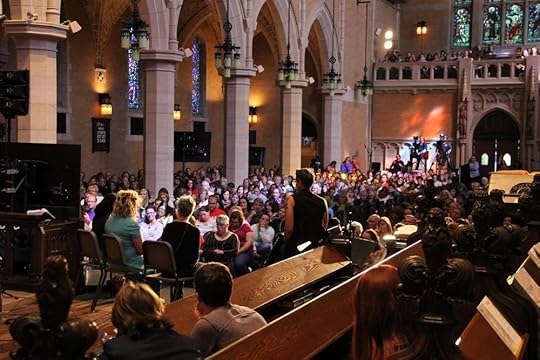
from Why Christian? 2015
I had to cut my spring speaking schedule short this year because we have a baby girl joining our family in May, (and I prefer not to travel more than 30-feet during my third trimester!), but if you live in Texas, Florida, or North Carolina, you may have the chance to say hello before I hole up for the rest of the season.
Upcoming events include:
February 23-24
Highland Park United Methodist Church Women’s Retreat
Dallas, Texas
I’ll be speaking about sisterhood, with talks entitled, “Sisters of Valor,” “Sisters in the Wilderness,” and “Sisters at the Table.”
Learn more, and register, here.
March 3-4
The Church of Bethesda-By-The-Sea Lenten Retreat
Palm Beach, Florida
On Saturday, I’ll be leading a sort of “Vacation Bible School for Adults,” where we learn to engage familiar Bible stories in new and creative ways. On Sunday, I’ll deliver a (very) short homily at the 8:00 a.m. & 11 a.m. services.
Learn more, and register, here.
March 16-17
The Why Christian? Conference
Duke Chapel, Durham, North Carolina
There are only a few dozen tickets left for this event, hosted by myself and Nadia Bolz-Weber, and featuring eight amazing and diverse speakers who will all respond to the question, “Why are you a Christian?” Learn more, and register, here.
Hope to see you soon!



January 25, 2018
Introducing: My New Book!
“Once upon a time, there lived a girl with a magic book…”
So begins the first pages of my next literary endeavor, Inspired: Slaying Giants, Walking on Water, and Loving the Bible Again, available now for pre-order and officially releasing June 12, 2018.
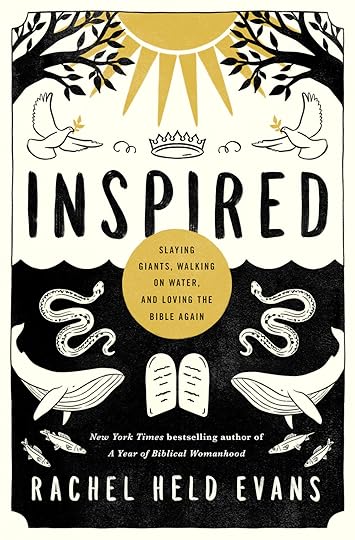
This is a book about the Bible. And it’s unlike any other book I’ve ever written, for in addition to the memoir, it includes original poetry, short stories, soliloquies, and even a short screenplay—all aimed at capturing the wonder and beauty of Scripture, while honoring the best in biblical scholarship and acknowledging the challenges of its most difficult passages.
My hope is that this book will rekindle in you a childlike love for the stories of the Bible, but in a way that engages the heart and mind, your faith and your doubts.
I’ve been hinting about the book on social media, but today I get to reveal the title and cover, both of which I love. Thanks to my editor, Jenny Baumgartner, for helping me land on the title (after hours of discussion and a bunch of polls, to which many of you contributed), and to the cover’s designer, Connie Gabbert, and the art director from Thomas Nelson, Belinda Bass. This was a team effort and I’m thrilled with the results.
I’ll be revealing more about the content and vision for Inspired in the weeks and months ahead. But in the meantime, if you jump over to Twitter and re-tweet my announcement there, you’ll be entered to win a FREE ADVANCED COPY!
Or you can pre-order here.
As always, thanks for your readership and support. It never fails to humble and move me that you would want to spend time in the company of my words. What an honor that is.



December 5, 2017
Mary, the Magnificat, and an Unsentimental Advent
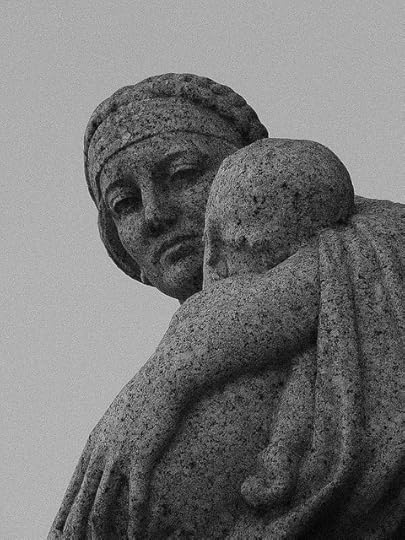
© 2011 Fraser Mummery, Flickr | CC-BY | via Wylio
It’s an unconventional birth announcement.
Defiant.
Prophetic.
Unsentimental.
We like to paint Mary in the softer hues—her robes clean, hair combed and covered, body poised in prayerful surrender—but this young woman was a fierce one, full of strength and fury. When she accepts the dangerous charge before her, (every birth was risky in those days, this one especially so), rather than reciting a maternal blessing, Mary offers a prophecy:
My soul magnifies the Lord, and my spirit rejoices in God my Savior,
for he has looked with favor on the lowliness of his servant.
Surely, from now on all generations will call me blessed;
for the Mighty One has done great things for me,
and holy is his name.
His mercy is for those who fear him
from generation to generation.
He has shown strength with his arm;
he has scattered the proud in the thoughts of their hearts.
He has brought down the powerful from their thrones,
and lifted up the lowly; he has filled the hungry with good things,
and sent the rich away empty.
He has helped his servant Israel,
in remembrance of his mercy, according to the promise he made to our ancestors,
to Abraham and to his descendants forever.
When sung in a warm, candlelit church at Advent, it can be easy to blunt these words, to imagine them as symbolic, non-specific, comforting.
But I’m not feeling sentimental this Advent. I’m feeling angry, restless.
And so in this season, I hear Mary’s Magnificat shouted, not sung:
In the halls of the Capitol Building….
"He has filled the hungry with good things, and sent the rich away empty.”
In the corridors of the West Wing…
“He has brought down the powerful from their thrones, and lifted up the lowly.”
In the streets of Charlottesville…
“He has shown strength with his arm; he has scattered the proud in the thoughts of their hearts.”
Among women who have survived assault, harassment, and rape...
“He has looked with favor on the lowliness of his servant. Surely, from now on all generations will call me blessed.”
Among the poor, the refugees, the victims of gun violence, and the faithful ministers of the gospel who at great cost are speaking out against the false religions of nationalism and white supremacy…
“His mercy is for those who fear him, from generation to generation.”
With the Magnificat, Mary not only announces a birth, she announces the inauguration of a new kingdom, one that stands in stark contrast to every other kingdom—past, present, and future—that relies on violence and exploitation to achieve “greatness.” With the Magnificat, Mary declares that God has indeed chosen sides.
And it’s not with the powerful, but the humble.
It’s not with the rich, but with the poor.
It’s not with the occupying force, but with people on the margins.
It’s not with narcissistic kings, but with an un-wed, un-believed teenage girl entrusted with the holy task of birthing, nursing, and nurturing God.
This is the stunning claim of the incarnation: God has made a home among the very people the world casts aside. And in her defiant prayer, Mary—a dark-skinned woman, a refugee, a religious minority in an occupied land—names this reality.
“God is with us. And if God is with us, who can stand against us?”I hear a lot of professed Christians right now suggesting that it’s okay if powerful men resort to a little lying, bigotry, abuse, and misogyny as long as Americans “get to say Merry Christmas again.” Besides the fact that virtually no one in this country has ever been prohibited from saying “Merry Christmas” in the first place, such a sentiment stands in blasphemous contradiction to the very doctrine of incarnation we are meant to embrace this time of year.
God did not wrap himself up in flesh, humbling himself to the point of birth in a stable and death on a cross, eating, laughing, weeping, and suffering as one of us, so that I can complain to management when a barista at Starbucks wishes me “Happy Holidays” instead of “Merry Christmas.” The incarnation isn’t about desperately grasping at the threads of power and privilege. It’s not about making some civic holiday “bigger and better.” It’s about surrendering power, setting aside privilege, and finding God in the smallness and vulnerability of a baby in a womb.
To claim that the lighting of a national Christmas tree each year makes this country “a Christian nation,” while its powerful systematically oppress the poor, turn away refugees, incite violence against religious and ethnic minorities, molest and harass women and girls and call them liars when they dare to speak up, is, in the words of the prophet Amos, sickening to God.
“I hate, I despise your festivals,” God says in Amos 5, “and I take no delight in your solemn assemblies… Take away from me the noise of your songs; I will not listen to the melody of your harps. But let justice roll down like waters, and righteousness like an ever-flowing stream.”
We cannot claim to embrace the Holy Family while withholding justice from those who would most identify with them. We cannot talk of “making Christmas great again” while taking the side of powerful and violent over the vulnerable.
The season of Advent is meant to be a time of waiting.
In years past, I lit candles, sang “O Come Emmanuel,” and pondered in stillness the joy of Christ’s first coming and the hope of his second.
But this year I cannot be still. This year, hope is hard, belief is hard.
And so I’m waiting with the angst of the prophets, with the restlessness of the psalmist who cried “How long, oh Lord, will You hide your face forever?” and with the stubborn, unsentimental hope of a woman so convinced the baby inside her would change everything, she proclaimed in present tense that the great reversal has already arrived—
The powerful have already been humbled.
The vulnerable have already been lifted up.
For God has made a home among the people.
God has made a home with us.



August 3, 2017
Hey Mommy Bloggers - Thanks.
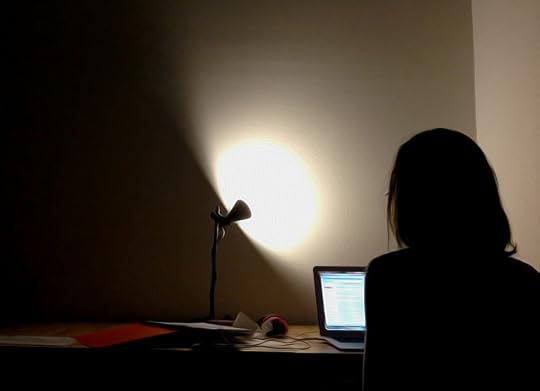
© 2014 Christopher Sessums, Flickr | CC-BY-SA | via Wylio
“So you’re a mommy blogger?”
When I started blogging a decade ago, I got this question a lot, and at times I responded with a touch of antipathy. Childless and independent, with far more interest in the latest political and theological debates than trends in cloth diapering, I, like so many others, dismissed “mommy blogging” as trivial, jejune.
It didn’t help that, back then, women writers of faith were such an underrepresented group online, several advertisers and publishers literally had no category for women like me, so they labeled me a “mommy blogger,” whether the term fit my work or not.
“I do have a blog,” I’d respond defensively, “but I’m definitely not a mommy blogger. I don’t even have kids.”
But my attitude toward “mommy blogs” changed once I actually started reading them. In between the photo dumps and product placements were some of the most honest, considered, and powerful essays I’d ever read, essays about things that really mattered: faith, doubt, feminism, race, mental health, addiction, community, friendship, mindfulness, grace and the unique joys and challenges of raising children in our highly-connected, yet increasingly isolating culture.
The women behind these blogs wrote with uncommon humor, courage and insight, often posting multiple entries a week—a schedule that would make the most seasoned professional columnist sweat. As I subscribed to more and more of their feeds, I came to realize the term “mommy blog” was insufficient to describe the breadth and depth of what these women were writing about online.
Sarah Bessey’s reflections on faith and feminism and Osheta Moore’s practical guidance on justice and peace challenged me to live as a more faithful follower of Jesus in those quiet, unpublicized moments when faithfulness really matters.
Denene Millner’s posts about parenting black boys as a black mother did far more to wake me up to realities of racial injustice in this country than my subscription to The New York Times, and Kristen Howerton’s “Rage Against the Minivan” blog introduced me to the concept of white privilege in a way that made sense and inspired change.
Bunmi Laditan, Jenny Lawson, and Jen Hatmaker routinely had me in stitches at my laptop. Nish Weiseth basically made me a democrat. Mihee Kim-Kort became one of my pastors.
Glennon Melton, of course, used her disarming humor and candor to invite readers to get real about everything from addiction, to perfectionism, to bullying, to the futility of trying desperately to “seize the day” amidst the fog of parenting young children. (Glennon’s gone on to write two bestselling books and raise millions of dollars for vulnerable women and children. The term “mommy blogger” doesn’t exactly cut it.)
Though my life looked very different from the lives of these women, their work gave me permission to exhale, to relax into the spirit of “me too” that pervaded the comment sections. They taught me too that our biggest questions, our deepest desires and fears and joys, often meet us in the quotidian challenges of marriage, parenting and home life—at the 3 a.m. feeding, in the tantrum at Costco, amidst piles of dirty laundry, at the community playground, in the bouquet of weeds left carefully on your pillow.
When I clicked through images of the largest protest in U.S. history to see millions of women—old and young, married and single, parents and non-parents—marching peacefully through the streets of every major city in the U.S., I couldn’t help but smile and think, “Look: mommy bloggers.”
Never underestimate what women can do together.
Eighteen months ago, I became a mother myself. So far, parenting has been a lot like driving without a GPS. We bought the parenting books of course, and we can turn to friends and family for help and advice, but when things get especially hairy, I often find myself conjuring the wisdom of mommy bloggers, past and present, whose words guide me the way a local gives an out-of-towner directions: “Turn left at the big red barn. Go down that road a few miles, maybe three. You’ll see a tree that’s been struck by lightening. Make a right there. Watch your speed because the sheriff’s always out this time of day.”
This terrain is new, yet familiar.
The emotional ups and downs are intense, but not surprising. The hard days are hard, but not unexpected. The beautiful moments are everything they said they would be….and so much more.
Thanks to all those “mommy blogs,” I knew ahead of time that feeling guilty, exhausted, and even angry didn’t make me a bad mom, that it’s okay to ask for help, to say you’re not okay. Thanks to the courage of other moms, I knew ahead of time that pregnancy after a miscarriage would be scary, that just because breastfeeding is “natural” doesn’t mean it’s easy, that my marriage and body and worldview would inevitably change, that "sometimes you feel two feelings at the same time, and that's okay."
...Okay, so that last one is from Daniel Tiger...I can't help it; that cat's in my head.
I wanted to write about this because the other day, my son decided to turn another diaper change into a wrestling match, and in my exhaustion, I got so frazzled and frustrated, I started shaking. I felt out of control, and that scared me. Then, from somewhere in the past, I heard the voice of a mommy blogger: Put him in his crib with some toys where he’ll be safe, and give yourself three minutes in the bathroom to cry it out. It's better for you both if you take the time to regain your calm.
I have no idea where I read that advice, but it saved by day.
So, to all the mommy bloggers—
Thanks.
Thanks for being brave with your words and with your lives. Thanks for telling the truth. Thanks for pushing through all the condescension and sexism and trivialization to share your point-of-view. Thanks for hitting “publish" even when it was hard.
I’m a better mom, a better Christian, and a better person because of you.



May 31, 2017
Breath, Fire, Wind, Womb: A Reflection on the Holy Spirit

© 2010 Shan Sheehan, Flickr | CC-BY | via Wylio
As the Church enters the season of Pentecost, I offer this reflection on the Holy Spirit from Searching for Sunday: Loving, Leaving, and Finding Church. (Note: The ebook is just $1.99 for the month of May!)
***
The Spirit is like breath, as close as the lungs, the chest, the lips, the fogged canvas where little fingers draw hearts, the tide that rises and falls twenty-three thousand times a day in a rhythm so intimate we forget to notice until it enervates or until a supine yogi says pay attention and its fragile power awes again. Inhale. Exhale. Expand. Release. In the beginning, God breathed. And the dust breathed back enough oxygen, water, and carbon dioxide to make an atmosphere, to make a man. Job knew life as “the breath of God in my nostrils,” given and taken away. With breath, the Creator kindled the stars, parted a sea, woke a valley of dry bones, inspired a sacred text. So, too, the Spirit, inhaled and exhaled in a million quotidian ways, animates, revives, nourishes, sustains, speaks. It is as near as the nose and as everywhere as the air, so pay attention.
The Spirit is like fire, deceptively polite in its dance atop the wax and wick of our church candles, but wild and mercurial as a storm when unleashed. Fire holds no single shape, no single form. It can roar through a forest or fulminate in a cannon. It can glow in hot coals or flit about in embers. But it cannot be held. The living know it indirectly—through heat, through light, through tendrils of smoke snaking through the sky, through the scent of burning wood, through the itch of ash in the eye. Fire consumes. It creates in its destroying and destroys in its creating. The furnace that smelts the ore drives off slag, and the flame that refines the metal purifies the gold. The fire that torches a centuries-old tree can crack open her cones and spill out their seeds. When God led his people through the wilderness, the Spirit blazed in a fire that rested over the tabernacle each night. And when God made the church, the Spirit blazed in little fires that rested over his people’s heads. “Quench not the Spirit,” the apostle wrote. It is as necessary and as dangerous as fire, so stay alert; pay attention.
The Spirit is like a seal, an emblem bearing the family crest, a promise of belonging, protection, favor. Like a signet ring to soft wax, the Spirit impresses the supple heart with the power and prestige of God, and no one—not kings, not presidents, not the wealthy, nor the magisterium—can take that identity away. The bond of God is made of viscous stuff. He has put his seal on us, wrote the apostle, and given us his Spirit in our hearts as a guarantee (1 Corinthians 1:22). In the rite of confirmation, which acknowledges the presence of the Spirit in a believer’s life, a thumb to the forehead reminds God’s children of their mark: the seal of the gift of the Holy Spirit. It’s as invisible as your breath but as certain as your skin, so pay attention; don’t forget who you are.
The Spirit is like wind, earth’s oldest sojourner, which in one place readies a sail, in another whittles a rock, in another commands the trees to bow, in another gently lifts a bridal veil. Wind knows no perimeter. The wildest of all wild things, it travels to every corner of a cornerless world and amplifies the atmosphere. It smells like honeysuckle, curry, smoke, sea. It feels like a kiss, a breath, a burn, a sting. It can whisper or whistle or roar, bend and break and inflate. It can be harnessed, but never stopped or contained; its effects observed while its essence remains unseen. To chase the wind is folly, they say, to try and tame it the very definition of futility. “The wind blows wherever it pleases,” Jesus said. “You hear its sound, but you cannot tell where it comes from or where it is going. So it is with everyone born of the Spirit” (John 3:8). We are born into a windy world, where the Spirit is steady as a breeze and as strong as a hurricane. There is no city, no village, no wilderness where you cannot find it, so pay attention.
The Spirit is like a bird, fragile alloy of heaven and earth, where wind and feather and flight meets breath and blood and bones. The rabbis imagined her as a pigeon, the Celts a wild goose. Like a dove, she glided over the primordial waters, hovered above Mary’s womb, and descended onto Jesus’ dripping wet head. She protected Israel like an eagle, and like a hen, brooded over her chicks. “Hide me in the shadow of your wings,” the poet king wrote. “Because you are my help, I sing in the shadow of your wings” (Psalm 17:8, 63:7). The Spirit is as common as a cooing pigeon and transcendent as a high-flying eagle. So look up and sing back, catch the light of God in a diaphanous scrim of wing. Pay attention.
The Spirit is like a womb, from which the living are born again. We emerge—lashes still wet from the water, eyes unadjusted to the light—into a reanimated and freshly charged world. There are so many new things to see, so many gifts to give and receive, so many miracles to baffle and amaze, if only we pay attention, if only we let the Spirit surprise and God catch our breath.
***
Read more in Searching for Sunday: Loving, Leaving and Finding the Church.



April 27, 2017
"We Believe in Mystery": Raising Kids in Faith
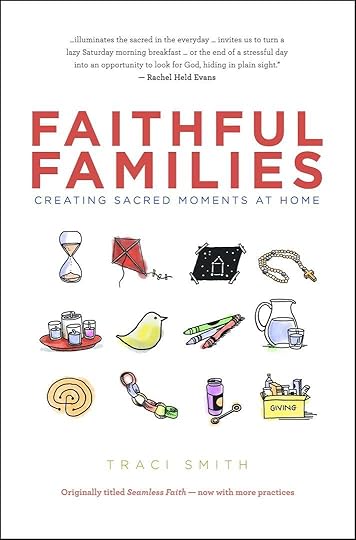
I’m in the final throes of finishing the next book and will be largely offline for the next few weeks, but I wanted to share a book that came across my desk that I loved and think you will too.
In Faithful Families: Creating Sacred Moments at Home, Rev. Traci Smith, a Presbyterian pastor and mama of three, offers super-practical, creative ideas for developing spiritual practices as a family.
As a new mom asking big questions about how we want to raise our son in the faith, I found this book incredibly helpful, because it starts so small. It doesn't tell me what to teach my kid about death and resurrection, but it gives me some meaningful, age-appropriate ideas for how to celebrate Easter.
Here’s more from my foreword to the book:
“So we know what we don’t want to teach him about God,” I said to my husband, Dan, as I collapsed onto the park bench, rubbing my pregnant belly. “But we haven’t decided what we do want to teach him.”
It was quiet between us for a moment, save for my labored breathing. A mile around our favorite walking track wasn’t as easy as it used to be, but then neither was anything else in those days leading up to and following our first baby’s birth.
Dan and I were both raised in loving, grace-filled homes, but in a fundamentalist religious culture that required total acquiescence to a strict set of theological beliefs and left little room for mystery. After years of doubt and deconstruction, we’d made peace with the meandering nature of our own faith journeys, but raising our little boy to do the same seemed daunting. We had no models for that, no roadmap. We knew what teachings we wanted to avoid, but were flummoxed about what to present as an alternative.
“Well I guess it’s like everything else with parenting,” Dan finally said. “We’ll just have to figure it out as we go.”
Indeed, parenting, like faith, can only be learned in the doing. So in this first year of being this little boy’s parents, we’ve been taking it a day at a time, praying for wisdom, and getting help from those ahead of us on the path—good friends and good guides.
Traci Smith is one of those guides. From the moment I met her, I knew Traci was the kind of mom I wanted to be: playful, empathetic, and deliberate about integrating spiritual practices into her family’s everyday life. We met at a Christian women’s conference in Texas, and throughout the first day of sessions, Traci insisted on wearing a rather loud, colorful pin her young son had crafted for her to remember him while they were apart. He’d have never known if she’d simply left it in her suitcase, but Traci wore that little pin proudly, and I loved how her eyes twinkled when she talked about her kids.
Traci brings that same joy to the book you now hold in your hands. Faithful Families is a thoughtful, practical guide to teaching by doing—to integrating prayer, tradition, Scripture, and ritual into the routines of a normal, busy family. What I love about this book, and about Traci’s work, is how it illuminates the sacred in the everyday, how it invites us to turn a lazy Saturday morning breakfast, a long car ride, the death of a pet, or the end of a stressful day into an opportunity to look for God, hiding in plain sight. “We believe in mystery,” she encourages us to tell our kids...and ourselves.
After reading Faithful Families (and dog-earing nearly every page for Dan), I felt relieved—relieved I didn’t have to understand theodicy before praying a simple blessing over my son’s bed at night, relieved I didn’t have to know all the answers before staring in awe into a starry sky, relieved I didn’t have to be free of doubt to be full of gratitude at our family’s “gratitude café.” For the first time since becoming a mother, I was thinking less about how I didn’t want to parent and more about how I did want to parent, particularly as it concerned my child’s spiritual formation.
It’s as true for children as it is for adults: faith must be practiced. We can teach, certainly, and instruct and inform. But what will be remembered are those tangible, in-the-flesh actions that get God out of our heads and into our hands. What will be remembered is the scent of a bubbling hot casserole for a family in need, the whoosh of a “Pentecost kite” whipping through the air, the feeling of prayer beads pressed against fingers, the dance of flame atop Advent candles.
As a new parent, I’m often overwhelmed at the prospect of raising a kind and happy son. With this book, Traci reminds us we aren’t called to be perfect; we’re called to be faithful. All we can do is attend to the present moment. All we can do is take it one step at a time.
Check out Faithful Families: Creating Sacred Moments at Home.



April 11, 2017
Spring Speaking Schedule

© 2009 Kevin Gessner, Flickr | CC-BY | via Wylio
It’s springtime!
I’m kicking off a relatively quiet spring schedule tonight (April 11) with an event at my home church, St. Luke’s Episcopal Church, in Cleveland Tennessee. The event, food, and childcare are all free, so join us! Starts at 6 p.m. There’s a covered dish BBQ. (More Info)
Then, next week, April 21-22, I’m headed to Wichita, Kansas and College Hill United Methodist Church for their Richard D. Greene Memorial Lecture Series. I’ll speak on “Keep the Church Weird” on Friday, April 21, at 7 p.m., then on “Keep the Bible Weird” on Saturday, April 22, at 9 a.m. and 11 a.m. (In that last session, I’ll be reading from my un-finished, un-published new book!) Both days will include a Q&A and lots of hangout/book signing time. Cost is $20 for each session, or $50 for all 3, but be sure to ask about scholarships/discounts. (More Info)
May 1-3, I’ll be speaking at the Episcopal Diocese of Virginia Bishop’s Conference for Lay Professionals, Clergy, and Spouses in Orkney Springs, Virginia. (More Info)
This is followed by a really wonderful writer’s workshop put on by Writing for Your Life and hosted by Western Theological Seminary and Hope College in Holland, Michigan, May 16-17. This event provides lots of one-on-one time with its speakers and representatives from the Christian publishing industry. Headline speakers include myself and Barbara Brown Taylor. (!!) You’ll also hear from Isaac Anderson (author), Sarah Arthur (author), Dwight Baker (Baker Publishing Group), Rachelle Gardner (literary agent), Brian Keepers (pastor), Ami McConnell (publishing industry veteran), Elizabeth Palmer (Christian Century), Patricia Raybon (author), Jana Riess (author), Stephanie Smith (Zondervan), and Marijke Strong (pastor). For writers who hope to work in the Christian publishing industry, I really can’t recommend this event enough. (More Info) Note: There’s a similar event in Nashville, July 18-19, featuring myself, Barbara Brown Taylor, Jeff Chu, Margot Starbuck, and a bunch of other cool people, so check that out if it’s closer for you.
Finally, on June 3, I’ll be in Little Rock Arkansas at Trinity Episcopal Cathedral. (More info.)
You can see the rest of my 2017 schedule here. Hope we get the chance to chat in person!



March 6, 2017
See you in Haddonfield, New Jersey, and Greenwich, Connecticut…

Although I’m working furiously to finish Book #4, I’ve made some time this month to head to the East Coast for events in Haddonfield, New Jersey, and Greenwich Connecticut.
This weekend, March 10-11, I’ll be speaking (along with Tony Campolo) at Lutheran Church of Our Savior in Haddonfield, New Jersey, for their Faith and Life Weekend. My lecture, "Keep the Church Weird," is on Friday night at 7 p.m. The event is free and open to the public. Details here.
March 25-26 will bring me to Christ Church in Greenwich, Connecticut for their fantastic Courage & Faith Series. On Friday night at 7 p.m., I’ll lecture on millennials, church, and Searching for Sunday, and on Sunday morning, I’ll offer a homily at 9:15 a.m., and a sneak peek at my new book during the Sunday school hour at 10:10 a.m. Tickets for Friday night’s lecture are $20 (although organizers tell me they have a “super-liberal scholarship program” and to contact them at info@courageandfaith.org if you’re interested.) Details here.
Hope to see you there!
Be sure to check out my full 2018 schedule.



March 1, 2017
Calling Your Reps and Planting Onions: A Plan for Faithful Resistance

© 2011 Ryan Hyde, Flickr | CC-BY-SA | via Wylio
What’s happening in America right now is not normal. This is not the routine ebb and flow of liberal and conservative shifts in power. It’s not merely the heated aftermath of a contentious election. What we’re facing in this country is an administration characterized by unprecedented levels of authoritarianism, dishonesty, incompetence, and corruption, and a legislative branch unwilling to hold the president accountable.
Influenced by advisors whose white nationalists views are well known, the president has waged a propaganda war against ethnic and religious minorities, stoking fear and hate by lying about crime rates, terrorist attacks, and voter fraud and by issuing executive orders that have already hurt many thousands of people around the world, including desperate refugee families. Muslims, including lifelong U.S. citizens, are being detained at airports for no other reason than their faith, and law enforcement officials report a surge in hate crimes against them. When challenged by the facts or with the law, the administration responds with attempts to undermine the free press and the judiciary, even going so far as to call the free press "an enemy of the people."
To make matters worse, with some important exceptions, the white conservative Church has largely supported the president, shrugging off his rampant dishonesty, self-aggrandizement, racism, misogyny, and bullying. My inbox is filled with messages from young evangelicals who feel angered and betrayed as they watch their religious community align itself with values they don’t recognize.
It’s been hard for me write about all this, I confess. For one thing, I have what the parenting books refer to as an “active toddler”—a little hurricane of distraction, full of joy and fury and stale Cheerios. I’m also finishing up my fourth book, which like every other book I’ve written, is proving the hardest EVER. But most of all, like many other writers and artists with whom I’ve spoken, I’m struggling a bit to process what’s happening. When every day brings with it another startling act of authoritarianism or oppression, it’s hard to catch your breath long enough to think of something worthwhile to say. These times call for good words, certainly, but more importantly they call for creative, concrete action.
So, since many of you have asked me what sort of practical steps you can take to combat the abuses of this administration and help those most affected by it, I thought I’d share my own personal plan of action in hopes it might prove useful to others. I’m the kind of person who tends to get passionate about something, overcommit, and then burn out, so I purposefully made these plans manageable. This is not a weeks-long protest; this is a years-long counter-movement that has to be sustainable to be effective. So with that in mind, here are six ideas:
1. Identify where you have the most influence locally and nationally, and lead there.Knowing I have something of a national platform, I’ve been thinking a lot about how to use it more effectively—perhaps by focusing my best op-ed writing on one or two and using the rest of my influence to amplify those church leaders, activists, and artists doing the good work of justice all around the world. (More on that below.) I’ve also been freshly convicted about the importance of strengthening my relationships with schools, nonprofits, and community organizations here in East Tennessee, and am considering new ways to volunteer/contribute that will work for our family over the long haul.
Perhaps you’re on the PTA at your kids’ school. What might you do to help encourage and equip teachers to combat what’s been called the “Trump effect”—an increase in bullying, particularly against children of color and religious minorities? What questions can you ask to ensure your school is teaching kids how to think critically about media and discern the truth amidst competing sources? It might be a good time to follow through on that longtime desire to volunteer as a coach or tutor and to familiarize yourself with federal laws protecting the rights of students with disabilities so you can speak up if they are threatened. Have the parents of vulnerable kids in your community organized? How can you lend your support?
Or maybe you lead a small group at church. What about introducing some justice-themed books into your weekly or monthly discussions? They don’t have to be overtly political; something like The Myth of a Christian Nation by Greg Boyd or Forgive Us by Lisa Sharon Harper, Troy Jackson, Mae Elise Cannon, and Soong-Chan Rah might be a good start. If you’re an elder, or deacon, or on the vestry, consider proposing that your church sponsor a refugee family through a local resettlement organization, or partner with a local mosque or synagogue to engage in interfaith conversations and activities that are mutually supportive. Incorporate lament and confession into your worship and confront the sins of racism and white supremacy with boldness. Don’t be afraid your actions will be considered “political.” Remember, silence in this climate is a political statement too.
Maybe you’re just good at getting friends together and planning social events. How about rallying the troops for a weekend protest, or organizing an informal fundraiser for World Relief? Or maybe you’re the quiet, steady one your friends respect and come to for advice. Speaking up on behalf of immigrants or LGBT kids will mean a lot coming from you, so have courage and say something when the Spirit nudges. Don’t let a racist, homophobic, or misogynistic comment slide. For too long white folks have tolerated that nonsense and it’s one reason we have the president we do.
2. Identify the organizations, artists, and leaders from marginalized communities working for justice and support them/ follow their lead.Many thousands of citizens, including many Christians, have been working for social justice for years—through nonprofit organizations, community organizing efforts, and justice-oriented churches. As tempting as it may be to try and start something new on your own, it is far wiser to identify these groups, at the local and national level, and lend your support.
For example, most cities have refugee resettlement organizations that assist families fleeing war-torn countries with housing, education, and employment. Ours in Chattanooga/Knoxville is called Bridge Refugee Services. Attend a fundraiser, volunteer a little time each week to help newcomers with errands, or partner with some friends to furnish a family’s home.
If voting rights are a concern to you, (and they should be, especially if you live in North Carolina), consider connecting with Rev. William J Barber II of the North Carolina NAACP as he leads protests and organizing efforts around voting rights and other important causes. Find out if your community has a local chapter of Black Lives Matter or attend the next Gay Christian Network conference or Reformation Project gathering. If you’re unsure of where to start, you can find a long list of faith-based community organizations through the PICO network.
Nationally, this is a good time to donate to the ACLU, the National Immigration Law Center, and organizations that protect reporters and a free press. If you’re like me, you’ve probably already “rage subscribed” to every newspaper or magazine the administration deems “an enemy of the people” for reporting the facts. Keep speaking up for a free press, and be sure and offer an encouraging word to any journalists you know.
Of course, there are many, many more that could be mentioned, which is why, through the 40 days of Lent, I’ll be using my social media feeds to offer “40 Days of Support” featuring 40 individuals, organizations, and initiatives whose work is crucial during these times. Be sure to look for that on Facebook and Twitter, where I’ll list specific ways you can help.
The important thing here is to follow the lead of those people who have been working within marginalized communities for years. They don’t need you to be their voice. They just need you to listen, to learn, and to offer support.
3. Get Political.This president cannot continue to abuse his power at the expense of the vulnerable without the support of congress, which means it is our duty to hold them accountable and demand change. I know some Christians are uncomfortable with that, preferring not to “mix” faith and politics, (as if we can compartmentalize), but as Aaron Niequist put it the other day, “if we want to love our neighbor, we will naturally get involved in building the systems that lead to flourishing, and fighting to change the unjust systems that target the poor, weak, and marginalized. We can't pretend to love our neighbor while we ignore the realities that hurt them.”
The gospel may not be partisan, but it is certainly political, and it’s as appropriate as ever for Christians to ask that the people who represent them represent the concerns of the poor, the sick, the marginalized, and the strangers whom Jesus loves. It’s appropriate, too, to expect Republicans in congress to hold this administration accountable to basic ethical standards, and to vote them out of office if they refuse to do so out of party loyalty.
Everyone I know who works in Washington tells me that calling your representatives is one of the most effective strategies for waging public protest. This year I added the phone numbers of my representatives to the contact list in my phone, and I try to call at least three times a week. (It might help to set an alarm on your phone if you’re busy or forgetful.) As one who struggles with a touch of phone phobia, I’ve benefited from scripts you can find online, which I adjust to reflect my own personal concerns. It also helps to ask questions—“Has Senator Corker spoken against Steve Bannon’s position on the National Security Council? Is he aware of Bannon’s white nationalist views?” And since all of my representatives claim to be Christians, I usually try to appeal to Christian values to find some common ground. Here’s how I see it: In the time it takes me to scroll angrily through Twitter for five minutes, I can write a script and make a call.
In addition to calling your representatives, consider attending a town hall, writing letters the editor of your local paper, connecting with the local Democratic Party to help with voter registration efforts and to challenge voter suppression/gerrymandering, and (because it’s becoming painfully obvious that progressives have ceded local politics to the extreme right for too long), running for office or helping a better candidate get the job. If, like me, you live in what seems like a hopelessly red district, you might want to check out Swing Left, which helps you locate the closest “Swing District” that will decide the majority in congress and join a team working to elect democrats, who won't give this president a free pass, to those seats.
4. Ground yourself in community and contemplation.I had the privilege a few years ago of meeting Dr. Cornel West, a man who has been engaged in activism and justice work for decades. As others will certainly tell you, the most immediate impression you get of Dr. West when in his presence is that this is a person of deep, seemingly limitless joy. Dr. West is no fool. He hasn’t got his head in the sand. Few people are as aware of the inequities that persist in our nation and as committed to prophetically calling them out. And yet Dr. West brings such a sense of hope and peace to his work, it’s contagious. “I cannot be an optimist,” he says, “but I am a prisoner of hope.”
These are trying times, and sometimes just keeping up with the latest news tempts one to despair. Dr. West reminds us that the only way to work for justice in a sustainable way is to be rooted in the nourishing soil of contemplation and community.
By contemplation, I mean spiritual practices of rest, prayer, and devotion that connect us to God in a way that unburdens. For some, this means beginning and ending each day in prayer and mediation. For others, it means taking a Sabbath away from all the noise of social media to hike or cook or read. For extroverts I suppose it means finding some friends with whom to verbally process…like, at a bar…or something? (Sorry. I don’t really understand your world.)
Christena Cleveland offers some really helpful ideas for both action and healing in her post “Wellness in the Age of Trump and Terror,” as well as some excellent reading suggests in “15 Books for Fighting for Justice in the Trump Era.” Ed Cyzewski writes one of my favorite blogs for contemplatives, and Lisa Sharon Harper’s The Very Good Gospel strikes me as an especially timely read at this moment. I’ve personally enjoyed returning to the work of Madeleine L’Engle and to the psalms in Scripture, and I stay in a much better state of mind when I take every chance to take my little guy to the park to blow bubbles and soak in the sunshine. (See also: “How to Stay Outraged Without Losing Your Mind” by Mirah Curzer.)
It’s also important to stay connected with community. I know a lot of folks want nothing to do with the church right now, and I get that. If your faith community is actively working to support the systems of white supremacy and patriarchy that are enabling this administration, you may need to take a break, or leave. (There are plenty of other churches actively working in the other direction, believe me!) But whether you go to church on Sunday mornings or not, try to stay tethered to a larger community in which you have an investment and which has an investment in you—maybe it’s a small group that gets together for pizza and conversations on Thursday nights, or maybe it’s the local chapter of a community organization, or maybe it’s the people in your neighborhood. Community keeps us accountable and compassionate. It prevents us from thinking too highly of ourselves and taking too much on. It reminds us that we need one another, that we’re not alone, and that we have a great cloud of witnesses spanning thousands of years and hundreds of cultures from which to draw strength.
5. Create opportunities for meaningful (but not necessarily “polite”) dialog.Probably the most common question I’m asked on the road these days is, “how can I talk to family, friends, and fellow churchgoers with whom I disagree politically?” I feel a bit hypocritical admonishing my readers toward kindness and understanding when I too have been avoiding such conversations like the plague, but I do think healthy, constructive dialog is possible, and that it’s best tackled around a shared table, over steaming plates of mashed potatoes and green beans, amidst the laughter and grace that emerges organically from deep, trusted relationships.
That said, we shouldn’t avoid talking about injustice because we’re afraid of making things uncomfortable or offending someone. Having lived down South my whole life I know exactly what it feels like to smile through racism and xenophobia in order to maintain that false, sticky-sweet sense of decorum. But this enlightening article from a German writer about how Americans are far too timid when confronting prejudice—“at the dinner table, I’ve noticed, what Germans call a discussion, Americans call an argument”—reminds us that this fear of confrontation is exactly what preserves the status quo, often with disastrous consequences. Now’s not the time to play it safe. If someone in your Bible study repeats a lie about Muslims, call it out. If your Grandma makes a racist remark, tell her it’s not okay. We’re stuck with this president in large part because white people are so worried about hurting other white people’s feelings we won’t name the sin racism.
(Here it’s important to note that telling oppressed people they need gracefully engage their oppressors is unhelpful. Let them make the call on how, and with whom, they engage.)
As far as creating opportunities for dialog within your faith communities, I’d recommend starting with a book club, perhaps around a book like Trouble I’ve Seen by Drew Hart, or The New Jim Crow by Michelle Alexander, or Assimilate or Go Home by Danielle Mayfield, or Forgive Us by the authors mentioned above—something that’s not directly about this election or this presidency, but that addresses issues related to justice. (If your conversation partners are more conservative, you can take turns picking the title.) This creates the opportunity for conversation without setting it up as a debate.
6. Plant onions.As I mentioned in my post, “2016 and the Risk of Birth,” in revisiting Madeleine L’Engle’s Genesis Trilogy, I’ve been struck by how forthcoming the author is about her own fears around raising children during the Cold War. She writes of one particularly worrisome season: “Planting onions that spring was an act of faith in the future, for I was very fearful for our planet.”
“Planting onions” has come to signify for me the importance of remaining committed to those slow-growing, long-term investments in my family, my community, and the world, no matter what happens over the next four years. Right now it may seem like an afternoon of changing diapers and wiping noses has little to do with “the resistance,” but raising decent, compassionate kids, and being faithful to the call to love them exactly as they are in exactly this moment, is the good work of the Kingdom, in any age. There have been times when I’ve wondered if all the hours I’m pouring into this next book, a book about the Bible, will be relevant when all anyone’s talking about these days is politics, but then I remember that this is the creative ground I’ve been called to cultivate, so I will trust my Maker with the yield.
Those after-school tutoring sessions may strike you as low-impact when you survey the great needs of the world, but the investment of your time and care may alter the trajectory of a kid’s life forever. Pastors, I know many of you are struggling with how to shepherd a politically diverse community through these tumultuous times, but please know those relationships you’re navigating one visit, one meal, and one awkward coffee hour at a time matter more than any political speech delivered by a celebrity.
We are bound to get discouraged, certainly, but we won't become useless until we abandon our onion patches, those little pieces of earth where we cultivate our greatest hopes and dreams for the world.
So, resist. Speak out. Call your representatives and get behind the people and organizations working for change. But don’t neglect your gardens—both of the literal and metaphorical type. Plant like the rain will come.
***
Follow me on Facebook and Twitter for #40DaysSupport. Some other articles and resources I’ve found helpful include:
“How to Stay Outraged Without Losing Your Mind” by Mirah Curzer
“The Time For Welcome is Now: Ten Ideas” by D.L. Mayfield
“Resistance Is Patriotic — and Christian: A 6-Point Strategy" by Jim Wallis
“Call the Halls” by Emily Ellsworth
This Vox interview with Garry Kasparov, a top Putin critic, on how to oppose Trump



Rachel Held Evans's Blog
- Rachel Held Evans's profile
- 1710 followers



